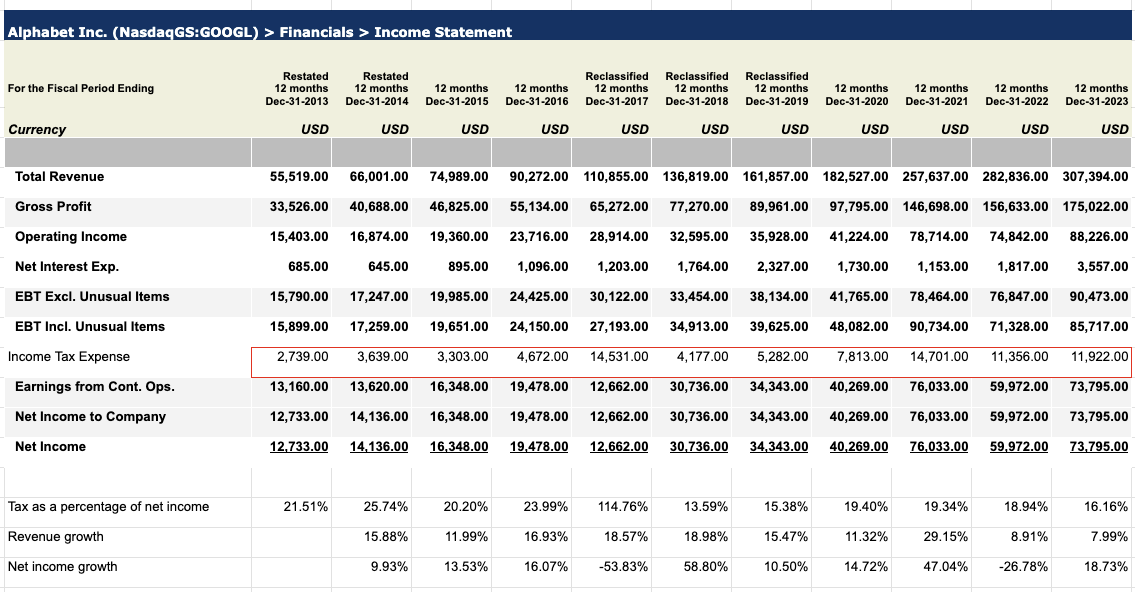BUSINESS REFLECTION
After the Bell: Google parent company Alphabet’s shameful tax practice

Alphabet brags about how much tax it pays in the US, presumably to satisfy the people calling those pesky Senate hearings. But it does mean the rest of the world is getting massively short-changed on the tax front.
One of the biggest issues bubbling up in the current Competition Commission media inquiry is how much tax organisations such as Google, Meta and TikTok pay in South Africa and elsewhere. To acknowledge partiality here, this also plays into the Daily Maverick’s offline protest yesterday.
As with so many complicated matters, there is much misinformation and obscurification around the topic for a variety of reasons. The errors are entirely unnecessary because some of the relevant numbers are a matter of public record. And some, of course, are not.
Let’s take a closer look, with apologies in advance for throwing some complicated spreadsheets at you, but this is all quite important, so it’s crucial to get everything straight — or at least as straight as we can. And these are also illustrative of the even more complicated issue of corporate globalisation and tax.
Research house Capital IQ does a great job of keeping up with all the pertinent numbers for a whole caboodle of companies around the world; here is a simplified snapshot of Alphabet’s income statement over the past decade. Alphabet is, of course, the parent company of Google. Be warned; it’s a thumper. (All figures are in millions.)
The first thing to notice is how Alphabet’s income has exploded over the last decade — it’s just incredible. To go from total revenue of $55-billion — already huge — to $307-billion in just 10 years beggars belief. The increase reflects how well the business is maturing — these are Google’s salad days. Also importantly, revenue growth and net income growth have bounced around a bit, but they are more or less in line. In other words, Alphabet is doing a good job of keeping expenses in line with profitability, on average.
Take a look at the line in the red box. It does show that Alphabet, as it claims, pays an enormous amount of tax. It varies a bit, but a tax rate of around 20% is more or less average for large, profitable, international companies. What is more, the absolute amount of tax paid has tailed off a bit over the past few years, but it remains a thumping amount and has more or less kept up with turnover. There is nothing here that would give an investor any real worries; in fact, you would be openly cheering. As a competitor, perhaps, not so much.
However, there is some important supplemental information. Google, like other big international companies, specifies how much tax it’s paying in its country of jurisdiction and how much outside the country. Here is that information.
From South Africa’s point of view, as well as any number of other countries around the world, there are a lot of things to worry about. In its default tax statement, which it trots out every time anyone asks, Google says two things: “Our effective tax rate over the past decade has exceeded 20% of our profits, in line with average statutory tax rates.” Well, that is a bit of a fib. First of all, the effective tax rate has only been above 20% twice in the past decade. Even if you just divide the tax paid by income, which you can see in the first graph, it’s been five years since it exceeded 20%.
The other thing Google always says is: “The vast majority of tax is paid in the US.” That’s great for the US and somewhat justified because the US is its biggest market by country. But just look at the difference — it’s enormous. Technically, its domestic tax payable in the US is $17-billion, while its foreign tax is only $2.5-billion. That’s the rest of the world. The whole rest of the world.
Alphabet brags about how much tax it pays in the US, presumably to satisfy the people calling those pesky Senate hearings. But it does mean the rest of the world is getting massively short-changed on the tax front.
What’s happening here? Well, my guess is that this is linked to the nature of the internet. If a foreign company pays for an advert that appears in SA (and other places) what is the “source” of the income? Is it where the ad is displayed, or where it is created? The way Alphabet is structuring its business is that it is adopting the posture that the source of the advert is in California for tax purposes, even though it’s displayed in SA and the product it’s advertising is in SA. This is just nuts. From this number, you can see why the Europeans — big users of Google — are so pissed with the company,
To be fair to Alphabet, I suspect they are doing this for simplicity rather than to reduce their taxation rate, which, as I pointed out above, is pretty normal. Imagine the complications of having to work out the tax on an advert which appears in hundreds of countries.
But on the other hand, the general principle is that tax is payable where the profit is earned, and this is very obviously not happening. Countries around the world are extremely coy about specifying how much tax is paid to them by international companies. If you ask SARS how much tax Alphabet paid last year, they won’t tell you because they consider it a private matter.
Frankly, I think this is wrong. Companies have been required to state their tax payments for centuries; it doesn’t seem overly burdensome to require them to specify how much they pay in each country where they do business. And if they don’t, the tax authority should.
This might not be tax evasion, per se, but it encourages tax jurisdiction-shopping and false invoicing. Taxpayers in all countries need to be reassured that every profitable business in their country contributes fairly to that country’s development. Google contributes in a myriad other ways and its service is indispensable. But we, like almost all other countries around the world, are being ripped off by these internet giants from a tax point of view, and that is shameful. DM
- Article edited to remove an misconception about deferred tax.



















At this point Google is too powerful for most jurisdictions to realistically rein them in; just ask Australia.
If you’re not the US, EU or China (China banned them outright), also maybe India, Google is basically bigger than you. Besides the craziness that would result from all free GMails in a country shutting down would be immense.
My personal opinion would be that the economic multiplier effects of the free (notwithstanding our data and advertising being the real product) services Google provides should cut them a little (but not unlimited) slack on the global tax front.